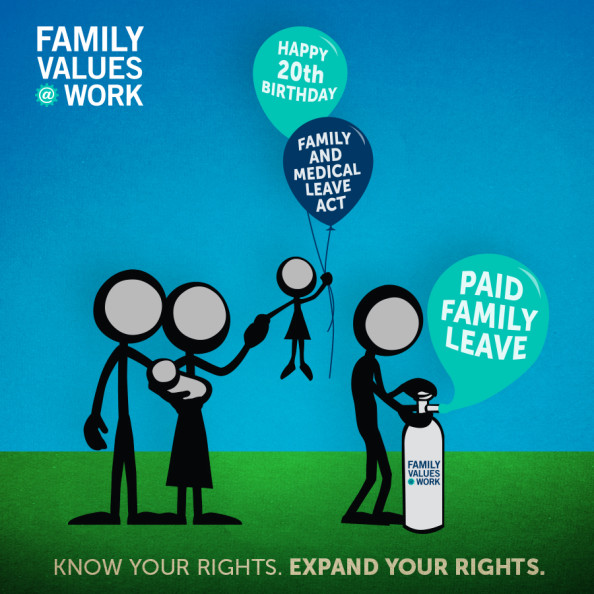by Ellen Bravo
Our families and our economy are at a crossroad. In fact, many people would say that we’re stuck at the intersection between the demands of the jobs we need and the families we cherish because our country’s workplace policies are stuck in another era.
Today, nearly three in four children have both parents or their only parent working outside the home, but only 12 percent of U.S. workers have access to paid family leave. This means when the people who deliver goods and services every day need to take care of themselves, or their kids, partners or parents, few are able to provide that necessary support without significantly compromising their financial stability.
This impacts nearly every American family. At some point in our lives, we all need time to recover from a serious illness, care for a sick loved one or look after a new child.
Tammy Russo of Coventry, Rhode Island, cares for her 20-year-old autistic son. Although Joey is her oldest child, Russo describes him as cognitively between the ages of four and seven, which makes it more difficult to deal with his frequent seizures. Last fall Russo had to take 10 weeks to help care for her son when he was hospitalized. The health scare was stressful enough without the financial hit of losing so much pay
Tammy Russo’s story and many like it helped convince legislators in Rhode Island to pass a Temporary Caregiver Insurance program that will go into effect in January. That’s the third state to implement such a plan. Russo described her relief in a television interview: “I won’t have to wonder about how we’re paying the bills when or if he has to be hospitalized again.”
But the majority of working people cannot take the leave they need without risking their jobs or economic security.
As President Bill Clinton recently said, “People desperately want to have successful families, to be good parents and to have a job and succeed at it. If you take one away to get the other, the country pays a grievous price, and every life is diminished.”
Right now, the only federal statute designed to help people meet the dual demands of job and family is the Family and Medical Leave Act, a law that was an important step but leaves out 40 percent of the workforce and guarantees only unpaid leave, which millions cannot afford to take.
The FAMILY Act, introduced today by Sen. Kirsten Gillibrand (D-NY) and Rep. Rosa DeLauro (D-CT), would help ensure Americans no longer have to choose between succeeding at work and taking care of a sick child, a newborn or an ailing parent. The bill would create a self-sustaining social insurance fund to allow workers to receive a portion of their pay when they need time for family or medical reasons.
Specifically, the bill would provide workers up to 12 weeks of paid leave for a personal serious illness, an illness of a child, parent or spouse and the birth or adoption of a child, among others. Workers and employers would each contribute a very small portion of their wages into this insurance program, enabling workers to receive up to 66 percent of their wages while on leave. And those replacement wages provided by the family leave fund go right back into the local economy.
The good news is, we know what such a fund looks like – and it works. Family leave insurance programs enjoy enormous success in California and New Jersey, with 1.4 million and 138,000 claims filed since their implementation in 2004 and 2009 respectively. This policy is also good for business – improving employee retention, decreasing turnover costs and increasing productivity. A 2011 study of California’s FMLI program estimated that it would save employers $89 million a year, and a recent Rutgers study shows that New Jersey’s FMLI program has also saved businesses money.
The FAMILY Act is a boon for state governments and taxpayers as well. Family leave insurance keeps families off of public assistance, promotes better immediate and long-term health outcomes for babies and mothers, shortens hospital stays by enabling family members to provide care, and allows families to care for aging parents in their homes rather than moving them to costly care facilities.
Congress has an important opportunity here to move us out of this crossroad and ensure that Americans can do what we all want – be both good caregivers and providers for those we love.
